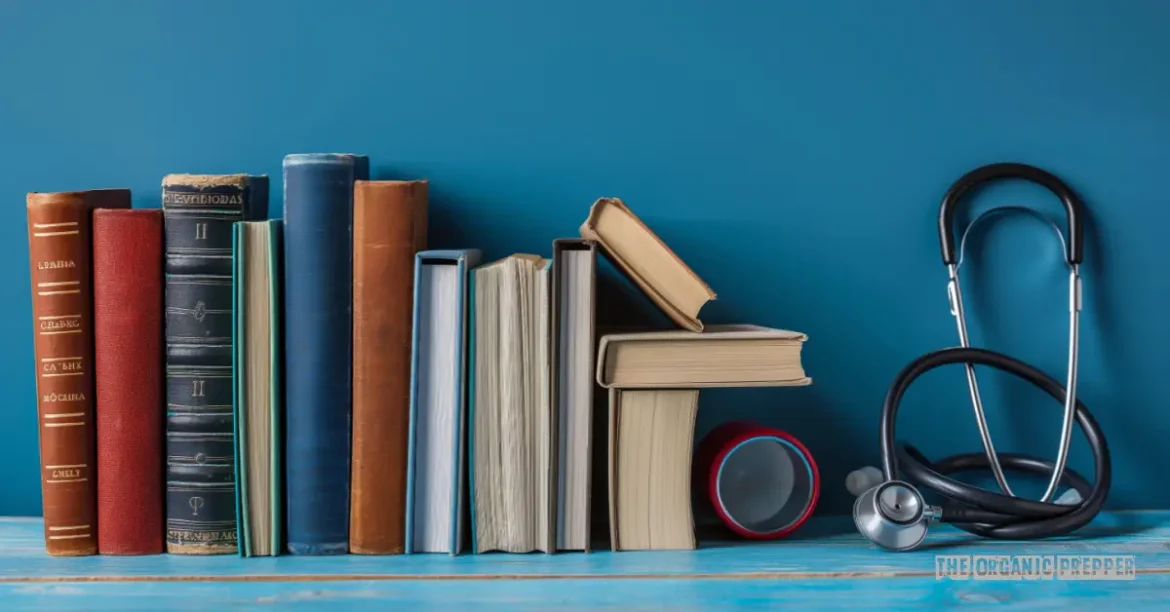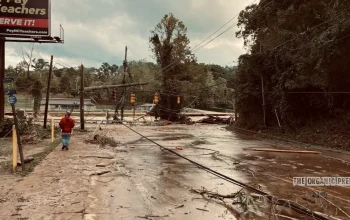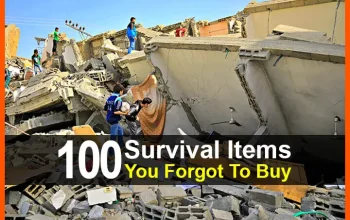(Psst: The FTC wants me to remind you that this website contains affiliate links. That means if you make a purchase from a link you click on, I might receive a small commission. This does not increase the price you’ll pay for that item nor does it decrease the awesomeness of the item. ~ Daisy)
Author of The Widow in the Woods
I sincerely hope that none of these medical books will ever be necessary, but recently, I’ve had the uncomfortable feeling that even if some kind of catastrophic disaster doesn’t strike us, we may be largely on our own regarding healthcare. I’ve always kept medical books on hand, even before I was a prepper, and it has paid off more than once. It’s a habit I picked up from my dad, who got the updated Merck Manual every few years.
In the case of disasters at the awful level we’re seeing in Appalachia right now, you just never know when you might be unable to leave your home because the roads and bridges have been destroyed.
A lot depends on the government going forward. I learned years ago not to make predictions of who would be named the winner of an election and I have been surprised before. So, I recommend preparing now, just in case things go in the direction of more censorship and control.
Here are some of the medical books on my shelf.
I know that we all criticize the WHO, but Where There Is No Doctor, recommended by the organization, really does deserve a place on your shelf. This is one of the Hesperian health guides which are widely used by medical personnel and nonmedical personnel in third-world countries. The book also contains information about preventing illness through proper sanitation and water management.
An oft-overlooked topic in medical preparedness is emergency dental care. A toothache can be excruciating and distracting, and an abscess can cause a severe threat to health. Another of the Hesperian guides, When There Is No Dentist is a very important book to add to your library.
It’s equally important to have a resource for natural health care in the event there is no medication to be found. Cat Ellis’s book, Prepper’s Natural Medicine, is precisely the book you need. It’s thorough and walks you through not only what to use, but how to use it.
Produced by the Department of Defense, The Special Operations Forces Medical Handbook is particularly useful for injuries, wounds, and even field surgery if necessary. There is also a veterinary section in the book for your furry friends.
Also known as the PDR, The Physician’s Desk Reference can be useful for researching prescription drugs. It can be difficult and expensive to get your hands on the latest version, but usually an older version will suffice in an emergency. This book is costly, and while I believe it’s important, if you can only get one book, get something more accessible to the layperson. I got mine at a yard sale a few years ago, so keep your eyes open and you may be able to get it for a steal.
This is the diagnostic manual of my childhood library. Okay, it was my dad’s library, but I have always found it fascinating to read. Yes, I was a nerd. The Merck Manual is a diagnostic manual that can help you to figure out what’s going on with the person you are caring for in an emergency. It’s another expensive one, but if you can swing it, I believe you’ll find it extremely useful.
Nope, not the television show. The book. It may be important in diagnosing a problem to know exactly what is where in the human body. Unless you’re a doctor, you probably don’t have every single part memorized. So, grab yourself an illustrated copy of Gray’s Anatomy. It’s a classic for a reason.
Keep your eyes open.
If money is tight, be sure to keep your eyes open for these books second-hand. You may be able to find them at yardsales, thrift stores, or online markets. Don’t worry about it being new. The information in the older books is still useful and relevant.
Do you have the proper medications?
Of course, it can be frustrating to know what to do for someone yet not be able to do it. Check out The Wellness Company’s medical kits to have important prescription medications on hand. Please note that once you have received your kit, you can order refills of medicines of your choice to have more on hand. I have several of these, and they’ve already come in handy to manage a sinus infection when I was laid up in bed after surgery.
I think it could be progressively more difficult to get our hands on these kinds of medications. Fish antibiotics, a popular choice, are now illegal to sell over the counter. That doesn’t make them impossible to acquire, but it can be harder than before.
I recommend also using some of these strategies to stock up on prescription medications used by your family members.
Time could be running out.
I hope it doesn’t come to this, but it’s entirely possible that a new wave of censorship could soon be upon us. That may take many forms, and access to medical information could be one of them.
Are there other medical books you recommend for your prepper library? Do you have any of the books listed here? What is your favorite? Have you ever used these books in good times?
Let’s discuss it in the comments section.
About Daisy
Daisy Luther is a coffee-swigging, adventure-seeking, globe-trotting blogger. She is the founder and publisher of three websites. 1) The Organic Prepper, which is about current events, preparedness, self-reliance, and the pursuit of liberty; 2) The Frugalite, a website with thrifty tips and solutions to help people get a handle on their personal finances without feeling deprived; and 3) PreppersDailyNews.com, an aggregate site where you can find links to all the most important news for those who wish to be prepared. Her work is widely republished across alternative media and she has appeared in many interviews.
Daisy is the best-selling author of 5 traditionally published books, 12 self-published books, and runs a small digital publishing company with PDF guides, printables, and courses at SelfRelianceand Survival.com You can find her on Facebook, Pinterest, Gab, MeWe, Parler, Instagram, and Twitter.



